REPRINTED WITH PERMISSION FROM THE CHRISTIAN SCIENCE MONITOR
Haiti is in the midst of escalating political and security crises. But one doctor can’t help but focus on the positive changes she can make for her country.
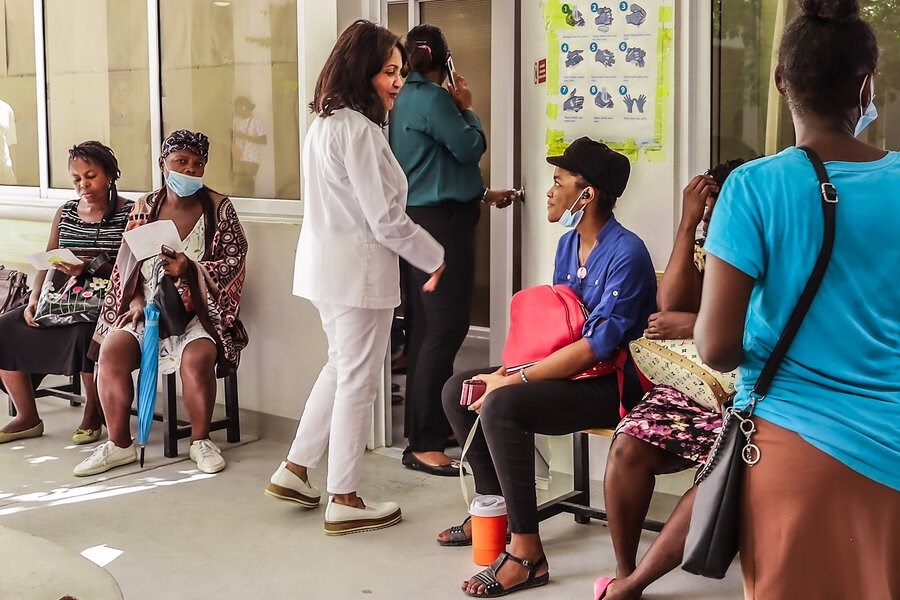 Dr. Marie-Marcelle Deschamps walks through the medical area of the Gheskio center, welcoming patients, in Port-au-Prince, Haiti, July 1, 2024. Victoria Onelien/Special to The Christian Science Monitor
Dr. Marie-Marcelle Deschamps walks through the medical area of the Gheskio center, welcoming patients, in Port-au-Prince, Haiti, July 1, 2024. Victoria Onelien/Special to The Christian Science Monitor
| PORT-AU-PRINCE, HAITI - Marie-Marcelle Deschamps was speaking at a conference in Washington last spring about her work running one of Haiti’s most innovative hospitals when the startling news started spilling in: Criminal gangs were releasing incarcerated people from a prison in Port-au-Prince, police stations and government buildings were under attack, and the international airport was shuttered.
“Gangs were shooting at the hospital campus yesterday,” the doctor told her audience at the Women Building Peace event on March 1. “There are no police to call.”
Many people would have considered it a blessing to be out of the country at that moment. But for Dr. Deschamps, it felt as though the timing couldn’t have been worse.
“Every day that I can’t go back is a catastrophe for me,” she said with a sigh, speaking from her hotel room in Miami several weeks later, where she was anxiously awaiting the possibility of flying back to Haiti. “I can’t sleep at night. My staff are struggling, people are dying ... and me? Hiding over here, unable to help them? No, no, it’s not fair.”
Dr. Deschamps is co-founder and deputy executive director of Gheskio, a hospital in Port-au-Prince known by its French acronym, where she has worked for the past 42 years. It’s not a typical clinic; it looks beyond physical health to tackle issues such as education, women’s leadership, job training, and community-building. The project is seen as a Haitian-led solution to challenges that historically the international community has tried to resolve from the outside.
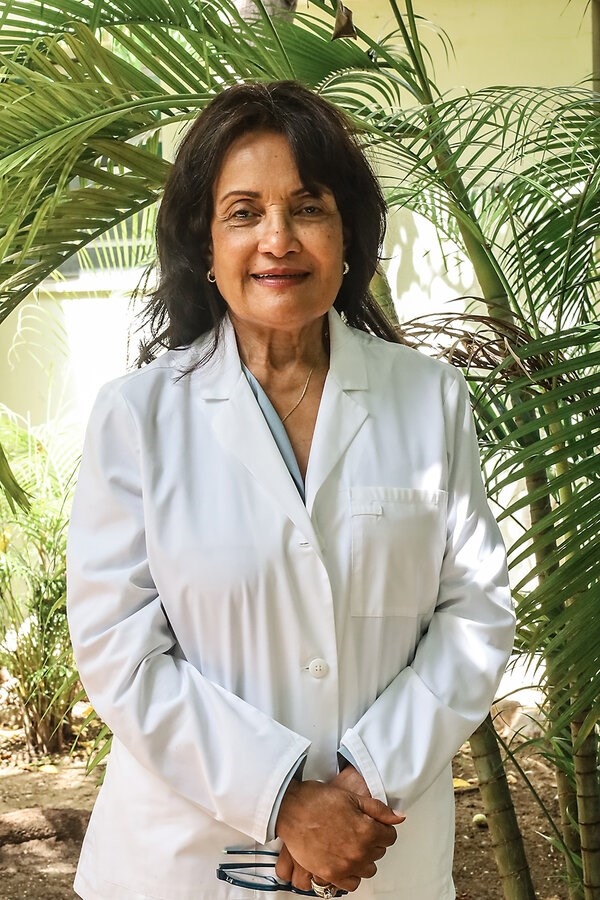 Victoria Onelien/Special to The Christian Science MonitorDr. Marie-Marcelle Deschamps is one of the founders of Gheskio, a health clinic that also tackles issues such as education, women's leadership, job training, and community-building.
Victoria Onelien/Special to The Christian Science MonitorDr. Marie-Marcelle Deschamps is one of the founders of Gheskio, a health clinic that also tackles issues such as education, women's leadership, job training, and community-building.
The doctor has guided the organization through earthquakes, epidemics, state coups, and political unrest. But when she finally returned to Port-au-Prince in April, she says she was faced with the most severe crisis she has ever seen. Hundreds of thousands of Haitians had fled their homes due to insecurity, many of whom began flooding her hospital in search of safety and treatment. Some people arrived close to starving, others with gunshot wounds, she says.
The crisis has only escalated since the spring.
“The rainy season has started, and people live in tents or on the streets,” she says in mid-June, noting an uptick in cases of tuberculosis and pneumonia. “A lot of women have been raped – they have no doors to close around them.”
“My goal and mission in life is to bring peace where I am,” she says.
Haiti hasn’t held presidential elections in almost eight years, and its last president was assassinated in 2021. In March this year, then-Prime Minister Ariel Henry was blocked by gangs from returning to the country and had to resign. Some 600 Kenyan police officers, part of a mission backed by the U.S. and the United Nations, have arrived this summer to try to halt the spreading violence and hunger here.
Gheskio is in downtown Port-au-Prince, adjacent to an enormous, gang-controlled area known as the City of God. The dusty access roads are teeming with heavily armed gangs, whose ranks have been reinforced by people who have escaped from prison. They regularly block the roads and kidnap people from passing cars.
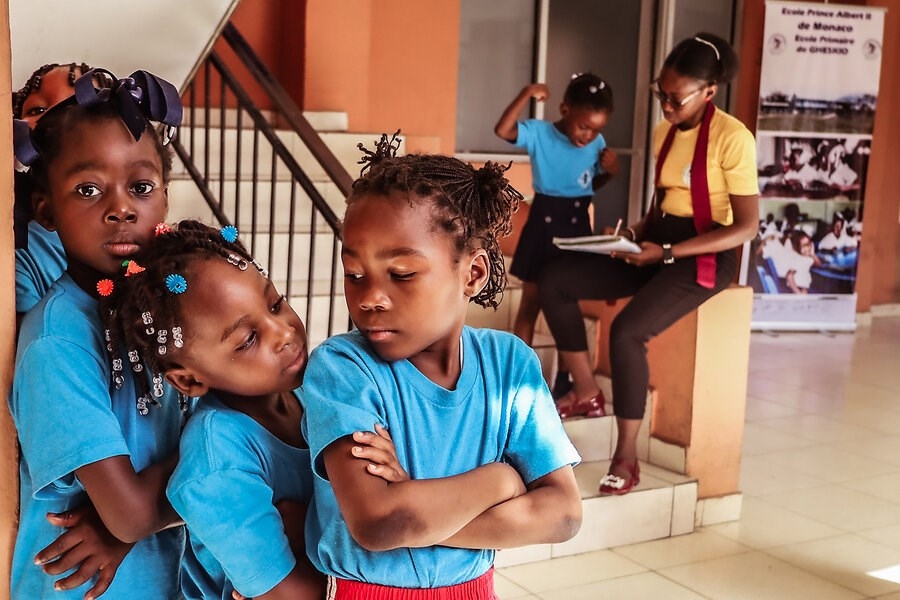 Victoria Onelien/Special to The Christian Science MonitorChildren from Gheskio's elementary school wait in line in Port-au-Prince, Haiti, July 1, 2024.
Victoria Onelien/Special to The Christian Science MonitorChildren from Gheskio's elementary school wait in line in Port-au-Prince, Haiti, July 1, 2024.
Only a handful of hospitals have survived the past year’s violence in Port-au-Prince, according to Jean Bosco Hulute, head of UNICEF’s health program in Haiti. About a five-minute drive from Gheskio is the State University of Haiti Hospital, the largest health facility in the country. For more than four months this year, it was under gang control; doctors and patients were chased off the grounds and wards were looted of everything from medical supplies to ceiling fans.
Nationwide, some 60% of hospitals aren’t operating because of shortages of fuel or medical supplies, according to a recent assessment by the Ministry of Public Health and Population and the World Health Organization. “A lot of people can’t afford the services that are left,” Mr. Hulute says.
“Without Gheskio, much of the vulnerable population would be without any facility to use,” he adds.
Gheskio receives some funding and equipment from UNICEF, requiring Mr. Hulute to occasionally visit. These trips require “careful planning and authorization from the head office” for safety purposes, he says.
“Dr. Deschamps, however,” he says with a chuckle, “she just takes her car and drives there.”
She holds weekly meetings with local community representatives, helping to earn respect for her organization’s work – even among gang leaders. When armed men on the street see her hospital ID, they let her pass, she says.
The grandmother of four knows it could be a dangerous choice. Every time she arrives at the hospital, she calls her family with a sigh of relief.
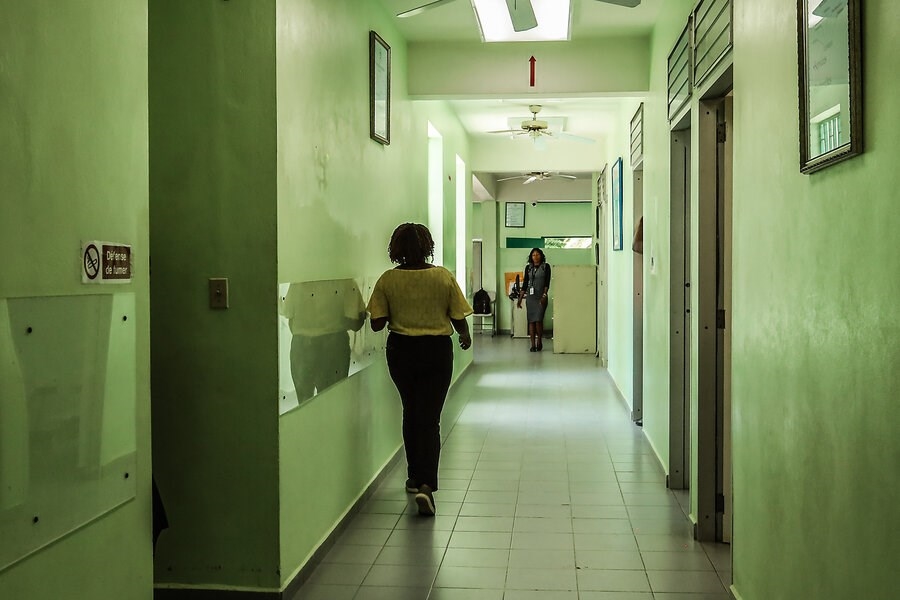 Victoria Onelien/Special to The Christian Science MonitorGheskio, in Port-au-Prince, is one of Haiti's most innovative hospitals.
Victoria Onelien/Special to The Christian Science MonitorGheskio, in Port-au-Prince, is one of Haiti's most innovative hospitals.
“I created [Gheskio] 42 years ago, and it’s the battle I have chosen for my life,” she says. “I have to take the risk.”
Dr. Deschamps decided to study medicine when she was 11 years old, following her father’s death. She founded the Gheskio hospital along with six other doctors in 1982, when she was in her 20s. It was one of the first institutions in the developing world solely dedicated to HIV/AIDS research. The project has grown into a general hospital that now serves more than 200,000 patients annually.
Today, the Gheskio grounds are like an oasis amid Haiti’s political and security-related chaos. Dr. Deschamps says she comes here to regain her strength, surrounded by green lawns, verdant gardens, and birds chirping from towering palm trees.
She has always loved nature. Growing up, she felt free playing in Haiti’s mountains and visiting its beaches. “I live between the Haiti of my past and this today,” she says of the country’s unrest. “I try to bridge the gap between those two worlds by making changes.”
Shortly after founding Gheskio, Dr. Deschamps was selected by a group of Haitian and American doctors to study in the U.S. There, she trained under Dr. Anthony Fauci, who would later become a household name during the COVID-19 pandemic.
“He always had a positive attitude, so we were similar in that way. It has become a strategy in my life to team up with positive people,” she says.
But she has learned that even optimists can hit their limit: Almost half her staff members have left the country since Gheskio was founded. She has her bleak days, too. Lately, she has had a hard time seeing an end to the violence, she says by telephone from the capital. She fears the Kenya-led police force is arriving too late. But then, someone or something always pops up to remind her why she keeps going, she says.
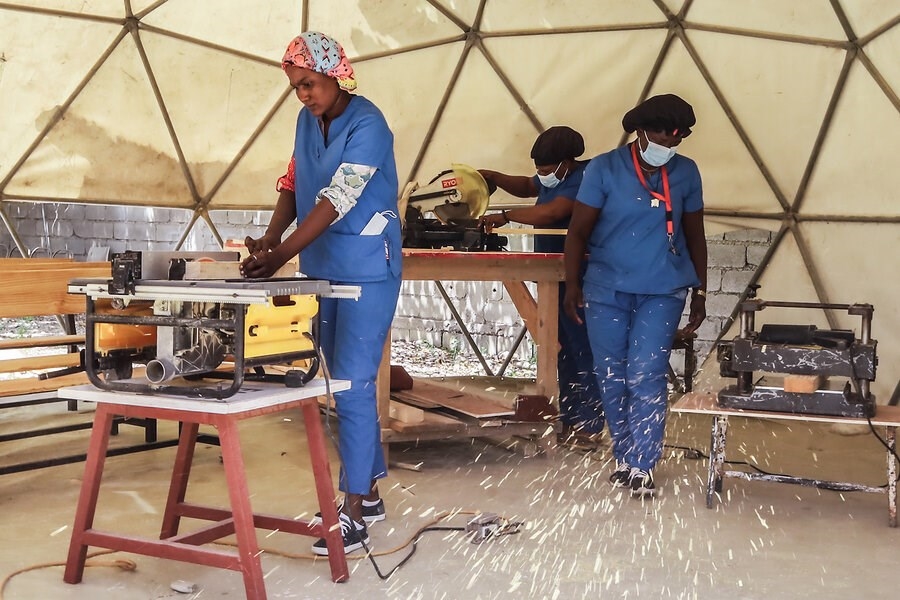 Victoria Onelien/Special to The Christian Science MonitorA group of women receives vocational training in carpentry in Port-au-Prince, Haiti, July 1, 2024. Gheskio has focused on women's empowerment.
Victoria Onelien/Special to The Christian Science MonitorA group of women receives vocational training in carpentry in Port-au-Prince, Haiti, July 1, 2024. Gheskio has focused on women's empowerment.
Recently, that was Ginette Pierre, who arrived at Gheskio after gangs attacked her home. “They killed my sister. I didn’t know where to go,” Ms. Pierre, in her mid-30s, recalls of the events that unfolded last year. “I met with Dr. Deschamps, and she asked me, ‘What do you dream to do with your life?’” she recalls. “I said I always wanted to become a stylist and open my own salon. The same day, she put me in a course in cosmetology here, at the clinic.”
Ms. Pierre is part of a women’s program integrated into Gheskio by Dr. Deschamps, offering K-12 education, workshops on making handicrafts to sell, and trauma counseling. The women’s program was founded in 2005 with an eye toward the key role that women – and their empowerment – can play in combating HIV and stamping out gang wars. For the same reason, Dr. Deschamps created a primary school for the participants’ children.
“It’s easy to be a doctor,” Dr. Deschamps says. “But to have the creativity to bring a primary school into a health center?” She grins from ear to ear. “I must say I’m very proud of this work.”
Leading a hospital in Haiti means learning from every crisis. Dr. Deschamps recently relocated some of Gheskio’s medical services to mobile clinics, shortening employees’ dangerous commutes to work.
“I’ve come to a [point] where I have no fear. Neither do the people around me,” she says. “I don’t think we would be able to evolve in a situation where we were fearful.”
Page created on 8/23/2024 12:27:11 PM
Last edited 8/23/2024 12:40:40 PM
